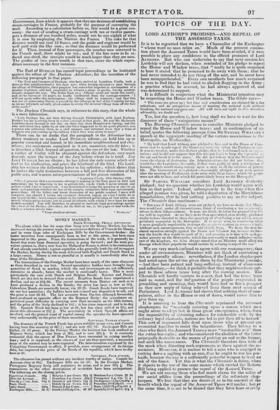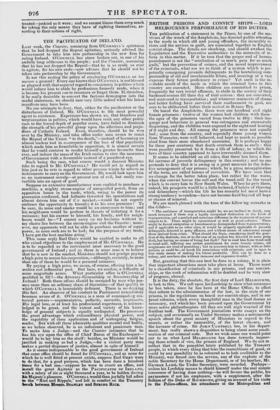TOPICS OF THE DAY.
LORD ALTHORP'S PROMISES—AND REPEAL OF THE ASSESSED TAXES.
IT is to be regretted that we have a Chancellor of the Exchequer " whose word no man relies on." Much of the present commo- tion about the Assessed Taxes would have been avoided, if it were possible to place any confidence in the official promises of Lord ALTHORP. But who can undertake to say that next session his Lordship will not declare, when reminded of his pledge to repeal the House and Window taxes, that " really he is quite surprised to hear it stated that he promised to do away with them; that he had never intended to do any thing of the sort, and he must have been misapprehended." Every one recollects how much surprised he was to find that he had voted to abolish flogging in the Army ; a practice which, he averred, he had always approved of, and was determined to support.
It is difficult to conjecture what the Ministerial intention may be respecting the House and Window taxes. The Globe says- " The taxes are given up ; but time and consideration are claimed for a due substitute, and an uninjurious means of meeting the national wish without breaking the national engagements. All will turn out right in this direction ultimately, we doubt not."
Yes, but the question is, how long shall we have to wait for the
discovery of these " uninjurious means?" •
The Morning Chronicle seems to consider Ministers pledged:to repeal the House and Window taxes ; and in confirmation of its belief, quotes the following passage from Sir SAMUEL WHALLEY'S' speech at the aggregate meeting of the various associations hi the Metropolis, on Wednesday. " He held that Lord Althorp was pledged to him and to the House of Csfns. mons that be would repeal the House-tax certainly when the Parliament met. It was no wonder, under this distinct pledge, that iv! Inul formed such an exNe- tation; and he did not suppose that this was put forth to keep the ' promise to the ear and break it to the sense.' He did not believe. that the Minister coold incur the charge of destroying the Adrninistration—be did not believe they would fare the Legislative Assembly, if they' were guilty of such a dereliction t./ honour, which would stamp infamy upon a man in all the relations of private life. The Government was pledged—irrevocably pledged—at an early period after the meeting of Parliament, to do away with these taxes; whirls the people were not able to bear, aud which fell particularly heavy on the Metropolis. ' • Sir SAMUEL WHALLEY considers Lord ALTHORP diStindly pledged ; but we question whether his Lordship would agree with him on that point. Indeed, subsequently to the time when this alleged promise was given, he told a deputation of the Marylebone householders, that he had nothing positive to say on the subject. The Chronicle thus continues- " But even if Lord Althorp were not pledged, we have no doubt that Minis- ters would not, under all circumstances, think of continuing a tax sic ;enera.112: odious to their fellow-citizens. It may, we think, be taken for granted that the tax will be repealed. As we have more than once stated, even worldly prudence ought to have dictated to them the propriety of abandoning a tax which was so peculiarly unpopular in the iiktropoliF. It 1S Ilt!V6r wise, by continuing what Is more peculiarly unpalatable, to tempt the p:ple to venture on cours:.s whieh, without such encouran-'ement, they would shrink from. 'We from the first de- clared ourselves strongly against the House and Window tax, because we foze- saw the handle that would-be made of it ; and pressing as it does with such pe- culiar severity on -the Metropolis, which has necessarily so much influence on the rest of the kingdom, we have always stated that no Ministry could afford the damage which their popularity would sustain by refusing to repeal the tax."
We are very much inclined to agree with our contemporary, that under all circumstances, Ministers will not think of continuing a tax so generally odious : nevertheless, if the London shopkeepers had acted upon the advice given them by the Ministerial journals, —had they been patient and long-suffering, instead of clamorous and refractory,—we think it probable that they might continue sub- ject to these odious taxes long after the coming session. The Chronicle will hardly venture to assert, that had the taxes been paid as usual, and the ind'gnation of the people evaporated in grumbling and spouting, they would have had so fair a prospect as they now enjoy of being relieved from them next session of Parliament. Lord ALTHortp had shown that nothing short of com- pulsion, either in the House or out of doors, would cause him to give them up. It is amusing to hear the Chronicle reprimand the recusant shopkeepers for "wantonly entering upon a course which men ought never to adopt but in those great emergencies, when, from the impossibility of obtaining redress for intolerable evils by the ordinary legal channels, nations are led to put their all to hazard." This sort of argument falls dead upon those who at present axe •
associated together to resist the taxgatherer. They belong to a class who think the Assessed Taxes a more "intolerable evil" than
the rotten boroughs ; and who considered the abolition of the latter principally desirable as the means of putting an end to the former, and such like annoyances. The Chronicle therefore fires wide of the mark when directing such arguments as these against the aS- sociators. Moreover, it is useless to tell a man who is engaged in cutting down a sapling with an axe, that he ought to use his pen- knife, because the axe is a sufficiently powerful weapon to level an oak of the forest. Yet this is what the Chronicle is doing, when it objects to the use of the same means which carried the Reform Bill being applied to procure the repeal of the Assesed Taxes. • We are not among those who feel much alarm for the safety of our social edifice from the proceedings of the refractory shop- keepers. • We fear that they are deceived as to the amount of the -benefit which the repeal of the Assessed Taxes will confer ;..hut jtt the same time, it is not.to he "denied that they have been scarvily treated—jockied as it were ; and we cannot blame them very much for taking the only means they have of righting themselves, ac- cording to their notions of right.





















 Previous page
Previous page